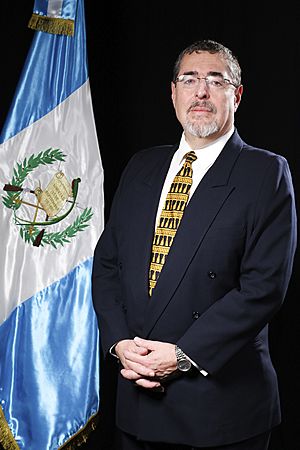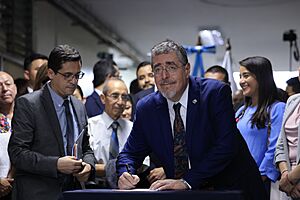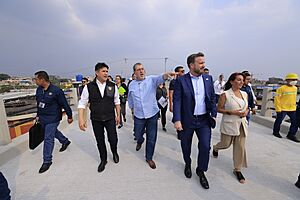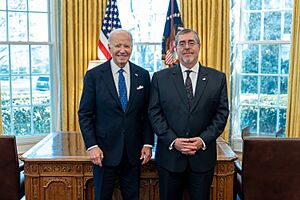Bernardo Arévalo facts for kids
Quick facts for kids
Bernardo Arévalo
|
|
|---|---|
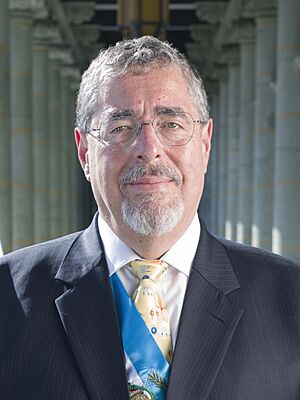
Official portrait, 2024
|
|
| 52nd President of Guatemala | |
| Assumed office 14 January 2024 |
|
| Vice President | Karin Herrera |
| Preceded by | Alejandro Giammattei |
| Member of the Congress of Guatemala | |
| In office 14 January 2020 – 14 January 2024 |
|
| Constituency | National List |
| Guatemalan Ambassador to Spain | |
| In office 1995–1996 |
|
| President | Ramiro de León Carpio |
| Personal details | |
| Born |
César Bernardo Arévalo de León
7 October 1958 Montevideo, Uruguay |
| Nationality | Guatemalan |
| Political party | Movimiento Semilla |
| Spouses |
Teresa Lapín
(m. 1983; div. 1992)Eva Rivara Figueroa
(m. 1993; div. 2004)Lucrecia Peinado
(m. 2011) |
| Children | 6 (3 stepchildren) |
| Parent |
|
| Alma mater | |
| Occupation |
|
| Signature |  |
César Bernardo Arévalo de León (born October 7, 1958) is a Guatemalan politician, diplomat, and writer who is the 52nd and current president of Guatemala. He took office on January 14, 2024. He is a co-founder of the Semilla political party.
Before becoming president, Arévalo was a member of the Congress of Guatemala from 2020 to 2024. He also worked as a diplomat, serving as Guatemala's ambassador to Spain in the mid-1990s.
Arévalo is the son of a former Guatemalan president, Juan José Arévalo. He was born in Montevideo, Uruguay, because his family was living outside of Guatemala at the time. His victory in the 2023 election was a surprise to many. After he won, there were some legal challenges to the results, but his victory was confirmed.
As president, Arévalo has focused on making changes in farming, health, and the economy. He has faced challenges from other parts of the government, which has made it difficult to pass some of his plans.
Contents
Early Life and Education
Bernardo Arévalo was born on October 7, 1958, in Montevideo, Uruguay. His father, Juan José Arévalo, was the president of Guatemala from 1945 to 1951. At the time of Bernardo's birth, his father was in political exile after a coup d'état in 1954.
Because his family moved around, Arévalo spent his childhood in Venezuela, Mexico, and Chile. He first moved to Guatemala when he was 15 years old to attend a private school in Guatemala City.
For college, Arévalo went to the Hebrew University of Jerusalem in Israel, where he earned a degree in sociology. He later earned a doctorate degree in philosophy and social anthropology from Utrecht University in the Netherlands.
Career as a Diplomat
In the 1980s, Arévalo began working for Guatemala's Ministry of Foreign Affairs as a diplomat. A diplomat is someone who represents their country in other nations. He worked at the Guatemalan embassy in Israel for several years.
Later, he returned to Guatemala and held several important roles in the ministry. In 1994, President Ramiro de León Carpio named him Deputy Minister of Foreign Affairs.
In 1995, Arévalo became Guatemala's ambassador to Spain. He presented his official papers to King Juan Carlos I. He left this role and his diplomatic career in 1996.
Political Career
In 2015, Arévalo participated in protests that called for the president at the time, Otto Pérez Molina, to resign. Soon after, he helped create a group that later became the Movimiento Semilla political party in 2017.
In the 2019 general election, Arévalo was elected to the Congress of Guatemala. He took office on January 14, 2020. In Congress, he worked on committees related to foreign affairs, human rights, and national security. In 2022, he became the leader of the Semilla party.
During his time in Congress, he worked on several proposed laws. These included laws to improve social security, regulate medicine prices, and protect animals from abuse.
2023 Presidential Campaign
On January 22, 2023, the Semilla party announced that Arévalo would be its candidate for president in the 2023 election. His running mate for vice president was Karin Herrera.
His campaign focused on fighting government corruption, improving safety, and creating jobs. Early polls showed he had very little support.
However, in the first round of the election, Arévalo surprised everyone by finishing in second place. This meant he would move on to a second-round run-off election against Sandra Torres, a former first lady.
Legal Challenges
After the first round, the official announcement of the results was delayed. Nine other political parties questioned the results and asked for a review. The courts ordered a review, which was completed in early July and showed no major changes to the results.
On July 12, the results were made official. At the same time, a prosecutor announced that the Semilla party was being suspended because of an investigation into how the party was formed. Arévalo said the suspension had no legal basis. The country's highest court later allowed the second round of the election to go forward.
Winning the Election

The second round of the election took place on August 20, 2023. Arévalo defeated Sandra Torres, winning the presidency.
After the election, Arévalo and his team began preparing to take over the government. This process is called a presidential transition. On January 8, 2024, he announced the people he had chosen to be in his cabinet of ministers.
Presidency (2024–Present)
Arévalo was inaugurated as the 52nd president of Guatemala on January 15, 2024. His inauguration was delayed by several hours but eventually took place after midnight. He is the first son of a former Guatemalan president to also be elected president.
First 100 Days in Office
In his first days as president, Arévalo made several symbolic changes. He ordered the removal of metal fences around the presidential offices to show that his government was open and accessible to the people.
He also dismissed hundreds of government employees who were linked to corruption or were not doing their jobs well. In February, his government created a special police force to fight crime.
In February 2024, Arévalo traveled to Europe. He met with leaders in Germany, France, Belgium, and Spain. During his trip, he also met with the president of the International Olympic Committee, who confirmed that sanctions on Guatemala's Olympic team were lifted.
In March, the Guatemalan Congress passed the Comprehensive Cancer Care Law. This law provides money for cancer research, treatment, and a new specialized hospital. Arévalo signed the bill into law on March 22, 2024.
Domestic Policy
One of Arévalo's goals is to improve education. In February 2024, his government announced a plan to repair 10,000 schools by the end of the year.
On April 23, Arévalo announced he was lowering his own salary by 25% to fulfill a campaign promise. Vice President Karin Herrera also lowered her salary.
In May 2024, Arévalo asked Congress to pass a law that would make it possible to remove the Attorney General, María Consuelo Porras. He said her office was being used as a "political weapon."
Foreign Policy
Arévalo's government has worked to build relationships with other countries. He has maintained Guatemala's diplomatic ties with Taiwan and has also expressed interest in improving trade with China.
His administration has kept its distance from Russia because of the invasion of Ukraine. He has also described the governments of Nicaragua and Venezuela as "dictatorial systems."
In May 2024, Guatemala voted in the United Nations to support upgrading the rights of the State of Palestine at the UN.
In June 2025, Arévalo visited Taiwan and met with President Lai Ching-te. He promised to continue strengthening the relationship between the two nations.
Political Ideas
Arévalo has said he is a "social democrat." This means he believes the government should help ensure social justice while also protecting private property. He is inspired by the political ideas of his father, Juan José Arévalo, and another former president, Jacobo Árbenz.
- Education: He wants to improve Guatemala's public schools by building new classrooms and restrooms and providing more textbooks.
- Health: He supports universal healthcare for all citizens. He plans to build hundreds of new health clinics, especially in rural areas, and a public hospital for cancer treatment.
- Social Issues: Arévalo has said he will not allow discrimination based on religion or sexual orientation.
Personal Life
Arévalo has been married three times and has six children, including three stepchildren. He has been married to Lucrecia Peinado since 2011.
Besides his native Spanish, he can speak English, Hebrew, French, and Portuguese.
During his presidential campaign, a TikTok video of him saying he was a fan of the singer Taylor Swift went viral. The video was popular with young voters and helped his campaign.
Honors
- Order of the Aztec Eagle (Mexico, 1995)
See also
 In Spanish: Bernardo Arévalo para niños
In Spanish: Bernardo Arévalo para niños
 | Janet Taylor Pickett |
 | Synthia Saint James |
 | Howardena Pindell |
 | Faith Ringgold |


